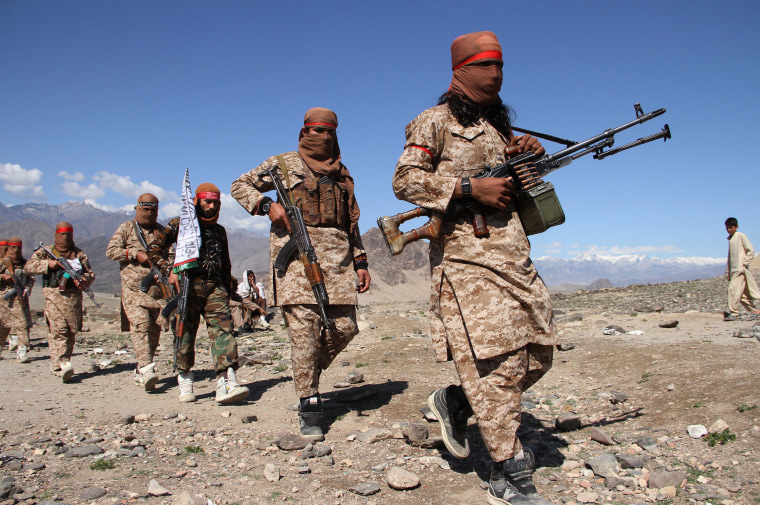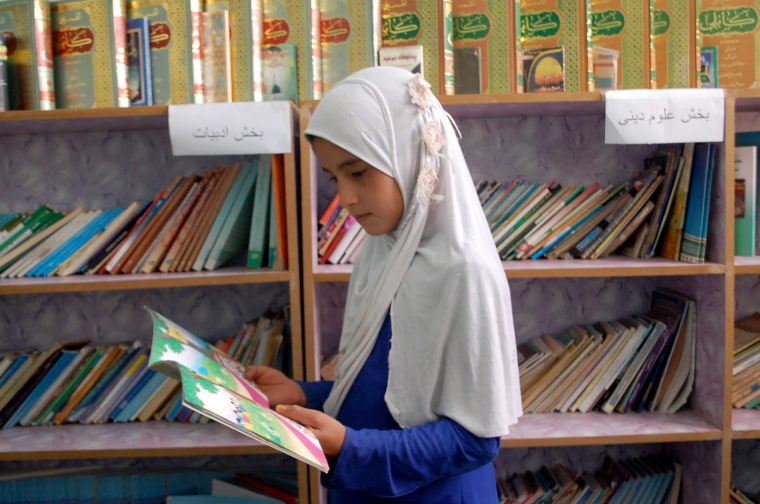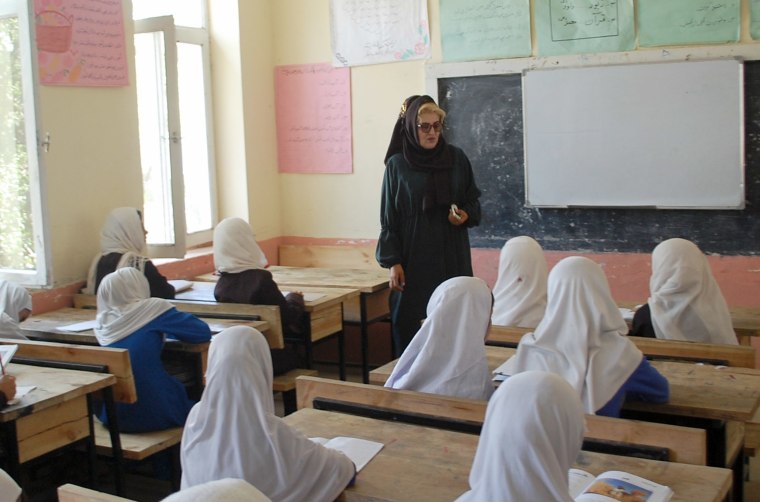LAGHMANI, Afghanistan — She should be standing tall. Instead, she walks in fear.
With American forces nearing their withdrawal and the Taliban on the march across Afghanistan, Lailuma Khaliqyar worries that the thriving Um-Salma girls school, where she serves as principal, will be easy pickings for the advancing Islamic militants.
“They shouldn’t abandon us at the moment that the Taliban is advancing,” Khaliqyar, 43, said recently. “When I walk to school, I take every step with immense fear and worry — I’m not sure I will return home safely.”
She fears it is only a matter of time until nearby Charikar, the provincial capital of Parwan province — a region known for its delicious grapes — falls to the Taliban. Once that happens, it will be the end for Um-Salma and the hopes and dreams of thousands of girls.
They will close my school,” said Khaliqyar, whose three daughters attend the one-story building defended by a lone, unarmed guard.
That U.S. forces quietly vacated the Bagram Airfield, once the epicenter of America’s war against the hard-line Taliban movement and a 20-minute drive from Um-Salma school, on July 2 just underlined her fears. And then on Monday the commander of U.S. and NATO troops in Afghanistan stepped down, marking a symbolic end of the U.S. military mission in Afghanistan.
‘She makes us proud’
When Khaliqyar took over the school in her native Parwan nearly 10 years ago, most of the male teachers were neglecting their jobs in favor of tending their farms, she and others interviewed by NBC News said. They did not like her efforts to raise the standards, and Khaliqyar had to beat back threats and pressure to step down.
But she triumphed, and went on to hire qualified teachers and establish extracurricular activities such as choir and volleyball at the school named after one of the Prophet Muhammad’s wives.
Under Khaliqyar, enrollment has increased threefold to 1,600. Now, the majority of seniors attend university — 36 out of 43 in the most recent graduates have gone on to higher education.

Her accomplishments have been noticed and, in 2019, the administration of President Ashraf Ghani named her one of the 100 best school principals in Afghanistan.
“There was nothing in the school before Khaliqar came as a school principal,” said Zuhal Seerat, a student at the school. “She brought in library, laboratory, sport venues, and much more.”
“She makes us proud — her perseverance makes her as a role model for me,” the 12th grader said.
The education of women and girls has been a central plank of the multinational effort to rebuild Afghanistan since the Taliban were toppled in 2001 in the U.S.-led invasion — so much so that images of young groups of schoolgirls wearing white headscarves have become a visual shorthand for progress.
But after billions in aid and 20 years of a U.S.-backed government in Kabul, an estimated 60 percent of the 3.7 million children who are not in school in Afghanistan are girls. Their low enrollment is explained in part by a lack of female teachers, particularly in rural areas, according to the U.N. children’s agency.
Even these imperfect gains are now at risk.
‘Properly veiled’
Um-Salma, its teachers and students would most likely fall foul of the Taliban, which sheltered 9/11 mastermind Osama bin Laden as he plotted the attacks and refused to hand him over.
While in power, the Taliban enforced a strict version of Islam that made women and girls practically invisible in public life. Girls were barred from attending school and women were not allowed to work outside the home or to appear in public without a male escort and an all-encompassing dress. Violators of these rules or edicts could be flogged in public or executed.
Now, as U.S. forces exit and the Taliban take control of territory at a pace that has even taken some militants by surprise, the group has made vague pledges to uphold women’s rights under Islamic law.
They say they support limited education of girls as long as it is according to their interpretation of the Sharia, or Islamic law. But reports from captured territory indicate the group has not reformed its views much when it comes to women and girls.
And a Taliban commander in Ghazni province and another in Helmand province has told NBC News that women would not be able to work in politics or business under their rule. Both commanders, who spoke on the condition of anonymity because they were not authorized to speak to reproters, said women would be able to teach “properly veiled” girls up to the age of 12 in religious schools. In addition, a medical track would be established so women could train as nurses and doctors, they said.

It isn’t only women and girls who worry about the future.
Sayed Yaha, who helped found Um-Salma and is its head teacher, says the group has detained him and killed 10 of his relatives — all young men in their 20s.
“I worry about the Taliban so much that I stay up late at night until 2 a.m. watching the news, hoping there will be good news of the defeat of the Taliban,” Yaha, whose wife is a teacher, said.
He added, “I only receive bad news.”
‘Cut you into pieces’
While she fears the Taliban, Khaliqyar’s first enemies after being appointed principal in 2012 came from within her own community, which is majority Tajik —an ethnicity that has long been at odds with the overwhelmingly Pashtun Taliban.
When she was appointed, men brandishing weapons and riding on motorcycles accosted her on the street, Khaliqyar says. Then came text messages and anonymous calls threatening to kill her.
“We want a male principal,” she said one message read. “Do not resist, we will cut you into pieces.”
The threats against her are an indication that the Taliban are not the only Afghans to have deeply conservative views of women’s place in society.
Khaliqyar says she reported incidents of intimidation and death threats to the police, the intelligence agency and local education officials. A spokesman for the police could not confirm that they had received the threats.
While these men tried to drive her out of her job, there were also men who supported her so she could remain principal.
Her husband, Qasim, a former soldier and bodyguard, took leave from his job in the capital to escort her back and forth to school during the early years.
Mohammad Sadiq Karimi was among a group of community elders who attended a meeting in a mosque and decided to override local opposition to her appointment.
“We knew Khaliqyar was committed to educating our girls,” said Karimi, 57, whose daughter studies at Um-Salma. “We hope this school will change Parwan province. We did not have such a principal before.”
Boosted by this vote of confidence, Khaliqyar said she was determined to persevere.
“I had to show people that I could run the school 100 times better than male teachers,” she said.
Now, though, all these efforts could be in vain.
“Peace is such a sweet dream,” she said. “But if the Taliban returns and brings their dark rule, there will not be peace — we do not want to be in darkness.”
Ezzatullah Mehrdad reported from Afghanistan, Saphora Smith reported from London and Mushtaq Yusufzai reported from Pakistan.
